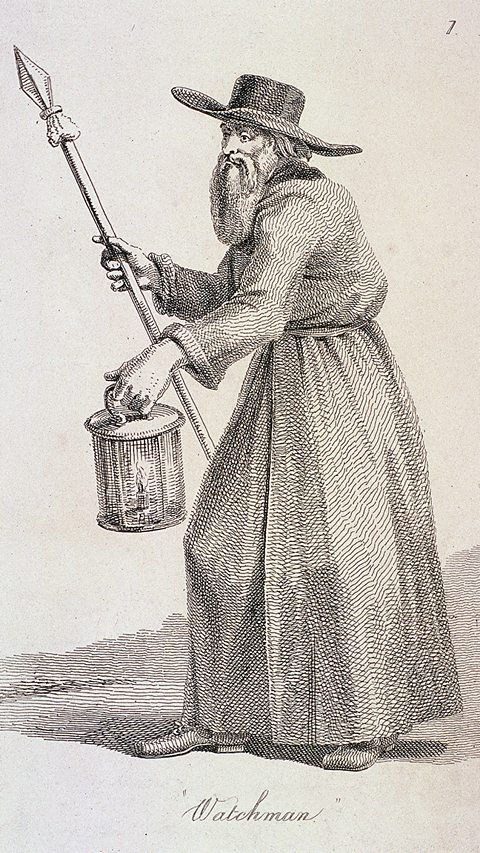Enforcing law and order
As in the medieval period, there was no professional police force. Instead, there were a range of unpaid and amateur officials, and the whole community was involved in law enforcement. A range of courts continued to operate, dealing with different types of crime. However, there were some important changes, such as the extension of the role of Justice of the Peace Someone responsible for maintaining law and order in a county. Often abbreviated to JP.
The people
The hue and cry
Just as in the medieval period, citizens were expected to respond to the hue and cryA method of raising the alarm to the rest of the village after a crime had been committed, usually by shouting loudly. if a crime was committed, to try to catch the culprit. The hue and cry was still led by the constable. The local posse comitatusA group of men aged 15 or over who were called up to chase a criminal. could still be called upon to help in the search.
Constables
Constables remained an important part of law enforcement. There were usually two constables for each town or village, normally wealthier and well-respected men. They served for a year at a time. Their duties included:
- leading the hue and cry
- dealing with small crimes such as begging
- dealing with people who broke Sunday laws
- inflicting some punishments, such as the whipping of vagrant±«Óătvless, unemployed person who wandered the streets. (also known as vagabonds)
- holding suspects in prison until their trial
Justices of the Peace
JPs ran the quarter sessions and petty sessions. In addition, the powers of JPs were extended in this period to include granting licences for alehouses, regulating sports and arresting vagrants.
Watchmen

Larger towns employed watchmen to patrol the streets at night and during the day. Their job was to arrest people who were drunk, vagrants and other criminals. They had permission to look in through peopleâs windows to check they werenât committing crimes.
Watchmen were supposed to deter criminals but they werenât very effective. They were paid poorly, were often elderly and were generally not very committed to the job.
Thief takers
Thief takers were private individuals who made a living from tracking down wanted criminals in order to collect the reward on offer. However, they were often quite corrupt, extortingTo take money from someone, either by force or by abuse of authority. money from the criminals they were supposed to catch. They were even known to set up innocent people by luring them into crime purely to collect the reward for catching them later on.
Jonathan Wild, nicknamed the âThief Taker Generalâ, was one of the most famous thief takers in the early 18th century. He supposedly policed the streets of London, handing over criminals and negotiating the return of stolen goods. However, in reality, it is suspected that he and his men were behind most of the crime in the area.
The courts
The assizes
The assize courts dealt with serious crimes, which could be punished by death. Royal judges visited towns in each area of the country twice a year to hear these crimes, which included:
- murder and manslaughterThe unlawful killing of someone without prior intent to do so. For example, killing someone 'in the moment'.
- burglary and grand larceny (the theft of goods worth more than 12 pence, which would have been a dayâs wages for a skilled tradesman at this time)
- highway robbery
- arsonDeliberately setting fire to something, which is a crime.
- rapeHaving sex with someone when they have not agreed to the sexual activity.
- witchcraftIn a historical context, this was thought to be a kind of magic that could be used to cause harm to people or property. Witches were often accused of obtaining their power from the Devil.
The quarter sessions
The JPs in each county ran quarter sessions four times a year. These courts tried less serious crimes, mainly petty theft - this included stealing goods worth less than 12 pence.
Petty sessions
By the 17th century, there was too much work for the quarter sessions alone to deal with. Therefore, smaller groups of JPs started to meet in their local areas in petty sessions. They dealt with small offences such as drunkenness.
Manorial courts
The manorialA medieval manor was the land owned by a local lord courts carried on dealing with minor crimes carried out by tenants on the lordâs manor, such as selling underweight bread or allowing animals to stray. However, they were replaced during the 17th century by the petty sessions.
Church courts
Church courts still dealt with crimes committed by the clergyPeople who conduct religious services, especially in the Christian church. A new law prevented people who were accused of serious crimes from claiming benefit of clergy.
The Church courts played an important role during the late 16th and early 17th centuries, when they were active in trying to maintain high standards of Christian behaviour. Swearing, breaking Sunday rules and committing sexual offences could all be tried in the Church courts.